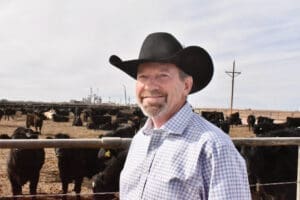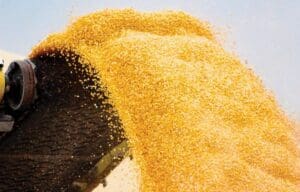Delicious, Nutritious Food is Just the Start
Article from Kansas Beef Council
Many products get publicity and special recognition during the year. But in Kansas, if any product deserves its own month, it’s beef. That is why Kansas Governor Laura Kelly has declared May as Beef Month in the state. This declaration makes the 35th consecutive year beef has received this honor. 
According to Kevin Thielen, executive director of the Kansas Beef Council, the value of beef to the economy and social fabric of the state is remarkable. “With more than 6.35 million cattle on ranches and in feedyards in the state, Kansas ranks third in the country,” says Thielen. “That’s more than twice the state’s human population. Kansas cattle producers are proud of the nutritious, delicious beef they help bring to tables in this state, across the country and around the world.”
Kansas has about 46 million acres of farm ground. Not all of this land can be used to grow crops, however. Grazing cattle is an ideal technique for efficiently utilizing grasses and plants growing on nearly 15 million acres of Kansas pasture and rangeland. These acres would be wasted if not for ruminants like cattle that can turn these resources into essential protein and nutrients for humans.
Kansas ranked second in fed cattle marketed, with 4.9 million in 2017. Beef cattle and calves represented 52.8% of the 2017 Kansas agricultural cash receipts.
The effect of the beef industry on employment is significant as well. According to the American Meat Institute, Kansas companies that produce, process, distribute and sell meat and poultry products employ as many as 19,502 people, while generating an additional 48,070 jobs in supplier and associated industries. These include jobs in companies supplying goods and services to manufacturers, distributors and retailers, as well as those depending on sales to workers in the meat industry. 
The product they help bring to market is one that contributes substantially to the human diet. Lean beef provides 10 essential nutrients, including zinc, iron, protein and B vitamins. It does all this for only 170 calories per 3-ounce serving. In fact, a serving of beef provides the same amount of protein as two servings (1 ½ cups) of cooked black beans – which have 341 calories.
Kansas ranchers and feeders are committed to producing beef responsibly and sustainably, Thielen says. But beef production refined over many generations is only part of the story. Producers also keep consumer needs and wants top of mind.
“While all aspects of beef raising and processing are important, producing beef that is delicious, safe, wholesome and nutritious is ‘job one’ for our industry,” Thielen says. “After all, producers of beef are also consumers of the beef they produce. They’re proud of their role in supplying this terrific food that so many people enjoy.”





